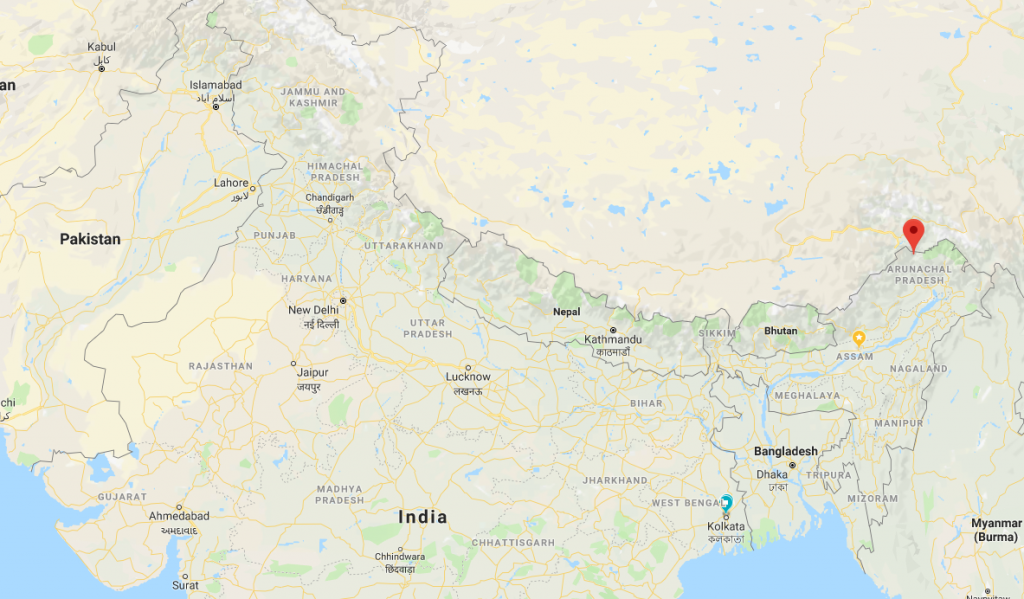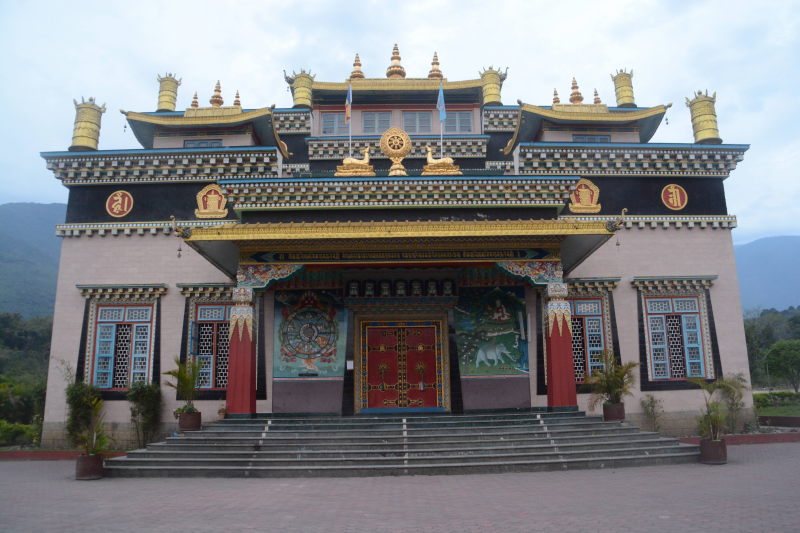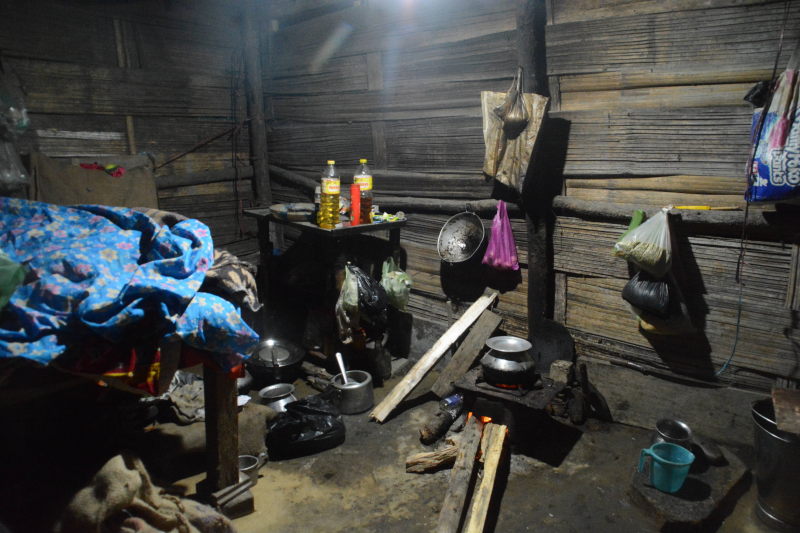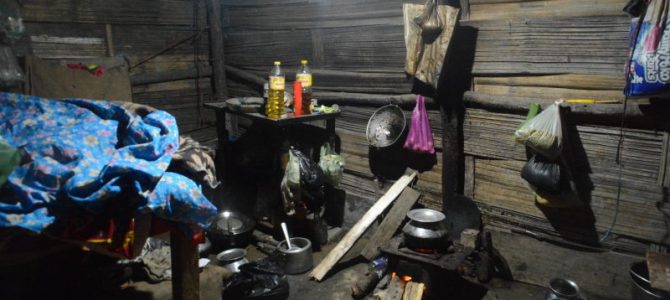India 360 made us travel to some really remote places. So remote that there were no tar roads, day-long electricity or phone connections. Travelling so remote can often lead to home sickness or apprehension. However, some wonderful-natured locals can go the extra mile, making you feel at home, however remote that place is from your own home. One such example was experienced by us at Tuting in Arunachal Pradesh.
We learned about Tuting from a few sources. First, there were a map of the tourist circuits of Arunachal Pradesh at a homestay at Mechuka (another beautiful remote village that we will cover in some post). In that map, Tuting was considered part of an upcoming circuit. This new circuit is not touristy yet, compared to popular ones like Tawang or Ziro. Second, an experienced member from a motorcycling group we met on the way told us that Tuting was beautiful and not frequented by tourists yet. He spoke from his own experience. Third, we wanted to cover more of Arunachal Pradesh than just Tawang, Ziro and Mechuka, that every tourist does anyway. India 360 needed to be deeper than the usual tourist circuits. So, Tuting it was for us.

Tuting on the map of India
Tuting is a very, very remote village in the north of Arunachal Pradesh’s Upper Siang district. It is 150 km away from the district headquarters, Yingkiong, which is the nearest town with a petrol pump. It takes an entire day’s drive, even for locals, to commute between the two villages using their tough SUV vehicles or trucks. We did it through a gruelling motorbike ride. That too on a day when it rained heavily and the road was rocky and marshy. Multiple places led to heart-in-mouth moments when the motorbike nearly skidded to a fall. Slipping and sliding over slush and bouncing over rocks, we made it safely to Tuting, low on energy, but high on hopes and curiosity. As is the case with a lot of remote villages all over India, it was a State Bank of India board that welcomed us to Tuting.
It was time to check into a room. Even before reaching Tuting, we were told that there were no hotels in the village, but accommodation was possible in one of two government guest houses. Both the guest houses were away from the village’s market square. One of the guest houses was reserved for the arrival of the Chief Minister of Arunachal Pradesh the next day. A room was available in the other guest house, but the price quoted was out of our budget. We told the caretaker that we’d be back if we couldn’t find any rooms inside the village itself.
Being a thriving village with visiting population, we expected the village to have at least 3 inns / lodges. But we didn’t find any. It was clearly a village not ready for visitors staying overnight. While on the highway, we noticed that the traffic between Tuting and Yingkiang was mostly that of the army, who stayed in army barracks, and locals, who stayed at their homes. Heck, there are no petrol pumps in Tuting and one must buy petrol cans from retail shops for a price much higher than that of standard petrol pumps. Luckily, on asking the locals, we were directed to one lodge, the only one in the village. But we were quoted a price way too high for our budget and certainly too high for the locality’s supply-demand! We walked out and asked some of the local shops about any other lodges they may know. The local shops were a convenience store, a snack stall and a hair-cutting saloon. We were told that the hotel we walked away from was the only one ready at this point. Others may spring up when Tuting receives more tourists. Seeing no other option, we returned to the hotel, where a rather weirdly behaving owner refused to give us the room we had just seen, even though we were ready to pay his asking price.
In desperation, we rode out of town towards the government guest house. The caretaker was nowhere to be seen and we had run out of options. In defeat, we returned to the village market once again. We asked the shops again, this time will more urgency, about any lodges they might know about. But they said that there were no more options. Seeing our desperation, the barber from the hair-dressing saloon offered to take us to his hut. A sense of relief flooded through us. He told us that he would be done by 6 in the evening and that we could come to him then. This left us with an hour to go.

Tuting monastery
Full of relief and with plenty of time in our hands, we took the liberty to visit the magnificent Tuting monastery, about a kilometre outside the village inside a clearing in a small forest. Tuting monastery is perhaps the only touristy location in all of Upper Siang district. Even so, there were no tourists that day. There were just a handful of local devotees and a school of monks. The monastery had a huge edifice for monk quarters. With a glimmer of hope, we asked if tourists were allowed to stay in any of the rooms. One of the monks told us that celibacy was mandatory, so married couples were not given rooms. An outside chance to find regular accommodation was crushed, but we had the barber as a backup. So we returned to the village, where the barber was finishing up.
We accompanied the barber on a road sloping up and ascending above the market to his tiny hut, which was an example at rudimentary existence. There were two beds with mattresses in two corners of the bamboo hut. Both the beds had mosquito nets. One electric lamp illuminated the room. Luckily, power supply is a regular part of Tuting’s life these days. A wood-fired stove for cooking sat in one corner. Underneath one of the beds was an array of boxes containing food provisions. There was no toilet inside the hut, but a public toilet was situated just outside. We had to use torches to walk between the hut and the toilet since there were no electric lamps outdoors on the trails that led from one house to another on this slope.

A snapshot of the barber’s bamboo hut.
We struck up a conversation with the barber and came to know that he was from Bihar. In another week, he was taking a break from his work to go home and spend time with his family, i.e. wife and children. Another shopkeeper from the market, who joined us for dinner later, was also from his village. They spoke a dialect of Hindi which was partly unclear to us. The barber expertly prepared dough for roti and set it aside. When he was ready to make the side dish, he asked us if we ate chicken meat. We are vegetarians and told him so. The barber was in a fix for a split second, but he asked us if eggs would do, since he did not have vegetables. We agreed to eat eggs. The shopkeeper went out to buy eggs for us. We felt happy, but also awkward, that the two went to extra lengths to accommodate us.
Over the course of the next hour, a sumptuous meal was ready. Rotis, egg curry, rice and dal, mostly made by the barber. The shopkeeper helped with baking the rotis. All the while, we hardly moved. Our clothes were damp from the rainy ride. We were totally exhausted from the 10+ hour ride and were discouraged to move. But the barber and the shopkeeper didn’t seem to mind our lack of a helping hand. The meal tasted excellent, considering that our bodies needed the nourishment. Being let into the barber’s home for rest and dinner was such as lucky break for us.
Late at night, the barber told us to sleep tight. He mentioned that he’d wake up by 3 am, get ready and leave for the market. We felt quite safe at his home and very rested from a sound sleep. In the morning, we were up shortly after 6 am, which felt quite late. The April sunrise in these parts of India is around 4 – 4:30 am. After getting ready, we met the barber at his saloon. When we offered him money for the stay and food, he refused. But recollecting that he was going to see his children in a week, we told him that the money was for getting something for the children. He reluctantly accepted and was grateful. Soon, we bade our goodbyes.
It took us another day-long ride to return to Yingkiong. We had spent two days, mostly perched of our motorbike, taking in the beauty of the really remote Upper Siang district and also taking frequent breaks to stretch our legs. We didn’t see any particular landmarks or get to stay at good lodges or even to bathe. But the memory of the route between the Yingkiong and Tuting will remain forever in our minds. And we can never forget the barber who made us feel safe for the night in his really humble abode, although we have to shamefully admit that we forgot his name! Thankfully, a thorough search through our phone’s address book will yield his name.


He even offered us a massage since we were tired. We graciously refused his genorosity. Its weird indeed how generous people are, when they have so little themselves.